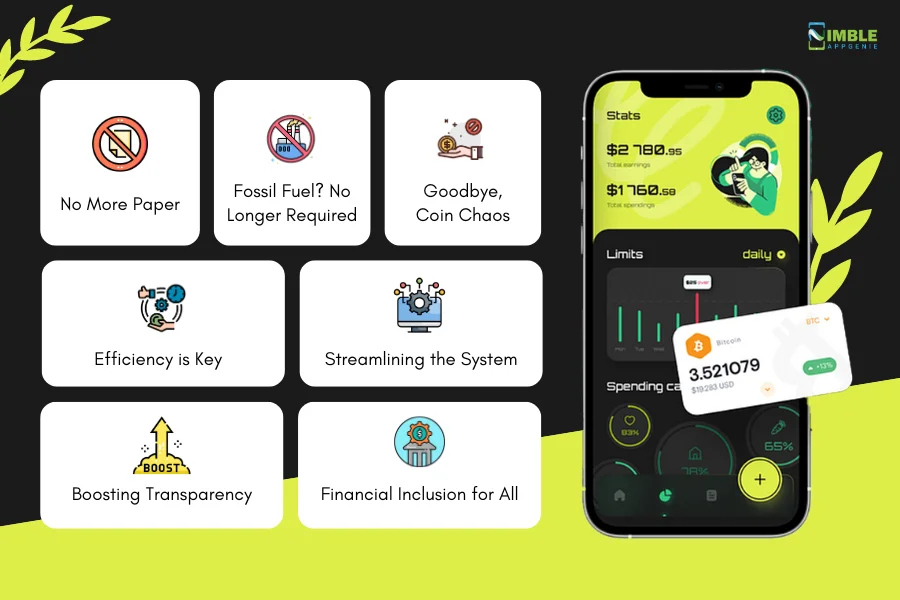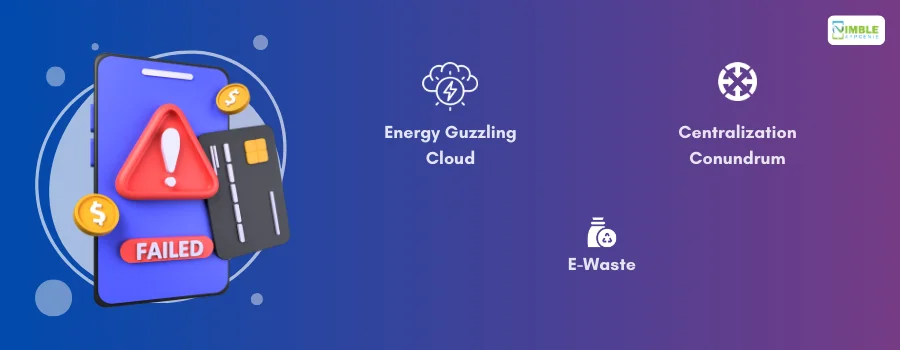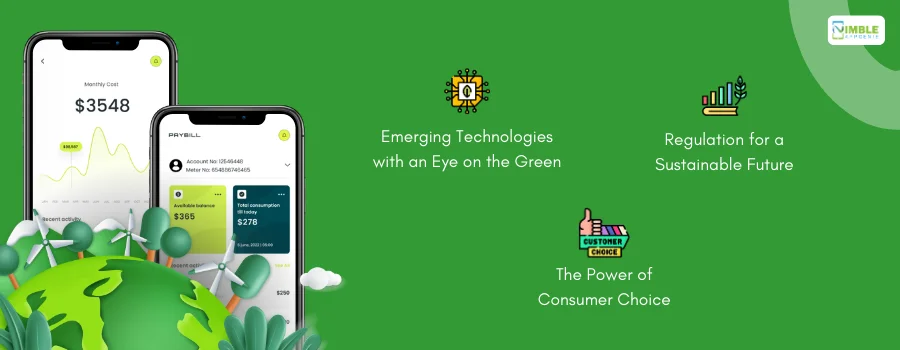Imagine a world where your wallet is as thin as your phone, but leaves a much greener footprint. This is the promise of digital wallets, a technological revolution transforming how we pay.
But is convenience synonymous with environmental responsibility? With global warming, extreme climate change, and other anomalies, a green moment needs to be stronger than ever. For that, it needs to be backed by top industries like Fintech.
So, how does mobile payment affect the environment and can we make it positive?
That’s exactly what this blog shall cover.
We’ll uncover the hidden costs of cash, unveil the potential benefits of cashless transactions, and navigate the challenges that lie ahead.
So, ditch the bulky wallet and join us on a journey toward a sustainable future, one tap at a time.
Did you know? According to a study, if all Americans switched to digital receipts, it would save enough paper to cover 48 football fields every single day!
Understanding the Green Agenda & What Does It Mean For Digital Wallets
In today’s world, environmental consciousness is no longer a niche concern but a global imperative.
The Green Agenda encompasses a broad spectrum of initiatives aimed at achieving a more sustainable future for our planet. It’s a call to action for individuals, businesses, and governments to work together in addressing the environmental challenges we face.
Climate change, deforestation, and biodiversity loss are just a few of the pressing issues demanding our attention.
The Intergovernmental Panel on Climate Change (IPCC) warns of the severe consequences of inaction, including rising sea levels, extreme weather events, and disruptions to food and water security.
The “Green Agenda” in the context of mobile payment refers to the increasing emphasis on environmental sustainability within the FinTech sector.
It’s about integrating eco-friendly practices and considerations into the development, operation, and proliferation of digital wallets.
For businesses in this space, aligning with this agenda means embracing opportunities for sustainable innovation while also navigating the inherent challenges.
Now that we understand what the green agenda means, let’s explore these potential benefits in the next section.
Benefits of Cashless Transactions: A Greener Outlook
You can develop a digital wallet and help the environment.
How? Well, there are various ways helping society go cashless supports the green agenda we just discussed.

Speaking of which, let’s look at the positive impact of cashless payment on environment:
1. No More Paper
Every year, the production of banknotes gobbles up a staggering amount of resources.
A 2023 study by the University of Leeds found that producing a single US dollar bill requires about 1.5 grams of cotton and uses enough water to fill an Olympic-sized swimming pool every four days.
Extrapolated to the billions of banknotes produced globally each year, the environmental impact of digital wallets is significant.
Digital wallets eliminate the need for physical cash, potentially saving millions of trees and reducing water usage by a substantial amount.
2. Fossil Fuel? No Longer Required
The transportation and maintenance of physical cash is a hidden environmental villain. A vast network of armored vehicles crisscrosses the country, replenishing ATMs and banks with cash.
According to a 2022 report by the International Journal of Sustainable Transportation, this cash logistics system is responsible for an estimated several million tons of CO2 emissions annually.
But if you are going cashless, this eliminates the need
Thus, it will lead us to a significant reduction in greenhouse gas emissions and a cleaner breathing planet.
3. Goodbye, Coin Chaos
The environmental impact of our love affair with coins goes beyond the familiar jingle in your pocket.
Mining and processing the metals used in coins, like copper and nickel, is an energy-intensive process that often leads to deforestation and habitat destruction.
A 2021 study by the World Wildlife Fund estimated that the global mining industry is responsible for considerable global deforestation.
Digital wallets eliminate the demand for coin production, reducing the environmental impact of metal mining and processing.
Plus, the fewer coins in circulation, the less litter and potential harm to wildlife from discarded coins.
4. Efficiency is Key
Paper receipts, those ubiquitous slivers of thermal paper accumulating in wallets and drawers, are another environmental consequence of traditional transactions.
Each year, billions of these receipts are printed, used briefly and then discarded, contributing significantly to paper waste.
Digital wallets allow for paperless transactions with digital receipts stored electronically.
This not only saves trees but also minimizes the environmental impact of paper production, transportation, and disposal.
5. Streamlining the System
Financial transactions often leave a trail of paperwork – statements, invoices, receipts.
These documents require paper, printing, transportation, and ultimately, disposal, all contributing to the environmental burden.
Digital payment apps eliminate the need for physical paperwork, streamlining financial processes.
A 2023 report estimated that a significant shift towards digital wallets could potentially save millions of trees annually through reduced paper usage in the financial sector.
6. Boosting Transparency
Digital transactions offer a clear and detailed record of spending, accessible with a few taps on your phone.
This level of transparency empowers individuals to make informed financial decisions and potentially reduce unnecessary purchases and impulse spending.
A 2022 study by the University of California, Los Angeles, found that consumers who switched to digital wallets experienced a decrease in impulse purchases compared to those using cash.
By encouraging mindful spending, digital wallets can contribute to a reduction in overall resource consumption.
7. Financial Inclusion for All
Digital wallets can play a crucial role in promoting financial inclusion, especially for those without access to traditional banking services.
By facilitating cashless transactions with minimal barriers to entry, digital wallets empower individuals to participate in the formal economy.
This financial inclusion can lead to a more sustainable and equitable future, with individuals making informed financial decisions and potentially reducing reliance on environmentally damaging practices, such as resource-intensive subsistence farming.
Double-Edged Sword: Drawbacks of Cashless Transactions
Everything has upsides and downsides and the same goes with cashless payments and digital wallets.
If you want to create the next best digital wallet app and take over the market, you must understand the negative impact of cashless payment on environment as well.
In this section, we shall be going through exactly that.

► Energy Guzzling Cloud
The convenience of digital wallets comes at a cost – the vast network of data centers that power these transactions.
These data centers require significant amounts of energy to function, raising concerns about their environmental footprint.
While some companies are making strides towards using renewable energy sources, many data centers still rely heavily on fossil fuels.
The challenge lies in ensuring that the growth of cashless transactions is balanced by a shift towards sustainable energy sources for data centers.
► E-waste
Our increasing reliance on digital devices for cashless transactions creates another environmental concern – electronic waste (e-waste).
Smartphones, tablets, and other devices used for digital wallets eventually become obsolete and are discarded.
The improper disposal of e-waste can lead to environmental hazards. Toxic materials like lead, mercury, and arsenic can leach into the soil and water, contaminating ecosystems and posing health risks.
Developing robust e-waste management systems and promoting responsible consumer practices are crucial for mitigating the environmental impact of digital wallets.
► Centralization Conundrum
The widespread adoption of digital wallets could lead to an increased concentration of power within the financial technology (FinTech) companies that manage them.
This raises concerns about data privacy and security.
In a cashless system, a significant portion of an individual’s financial transactions are concentrated within a single platform.
Data breaches and security vulnerabilities within these platforms could have serious consequences for consumers.
In addition to this, the potential for these companies to collect and analyze vast amounts of user data raises privacy concerns.
The first digital wallet, called DigiCash, was developed in the early 1990s! While it didn’t gain mainstream adoption, it paved the way for the digital wallets we use today.
What Does It Mean for Digital Wallet Startups & Businesses?
Understanding the green agenda for digital payments is a big lesson for fintech startups.
The environmental impact of digital wallets presents a compelling opportunity and a complex challenge for startups and established businesses in the FinTech space.
Understanding both sides of the equation is crucial for navigating this evolving landscape.
| Aspect | Opportunities for Sustainable Innovation | Challenges and Considerations |
| Leading the Green Charge | Digital wallet companies can become environmental leaders by using renewable energy for data centers, engaging in e-waste recycling, and incorporating eco-friendly features. | Navigating the Regulatory Landscape: Keeping up with and adapting to environmental regulations is crucial, which may include enhancing data security or improving e-waste management practices. |
| Transparency is Key | Trust with users can be built through transparency about the environmental impact of digital wallets, including disclosing energy consumption of data centers and efforts towards sustainability. | Balancing Convenience and Security: Environmental initiatives should not compromise data security or user convenience, necessitating secure yet user-friendly solutions. |
| Education is Power | Users can be educated about the environmental benefits of going cashless and responsible e-waste disposal, promoting a sustainable ecosystem. | Collaboration is Key: Addressing the environmental impact of cashless transactions requires collaboration between FinTech companies, policymakers, and e-waste management organizations. |
Takeaway: The environmental impact of digital wallets encompasses both challenges and opportunities. By committing to sustainability, ensuring transparency, and fostering collaboration, digital wallet companies can navigate these complexities and lead the way toward a greener future in the FinTech space.
The Future of Cashless Transactions: A Green Horizon?
The environmental impact of digital wallets unfolds like a story yet to be written.
While the present offers a blend of benefits and drawbacks, the future holds the potential for a greener horizon. And it goes hand in hand with digital wallet trends.

Here’s a glimpse into what the future of cashless transactions might hold:
- Emerging Technologies with an Eye on the Green: The rise of digital currencies like central bank digital currencies (CBDCs) presents both opportunities and challenges. The underlying technology, blockchain, can be energy-intensive. However, advancements in blockchain technology, such as proof-of-stake validation methods, could lead to a significant reduction in energy consumption.
- The Power of Consumer Choice: As consumers become increasingly environmentally conscious, their choices will shape the future of cashless transactions. A growing demand for sustainable FinTech solutions will incentivize companies to prioritize eco-friendly practices and invest in green technologies.
- Regulation for a Sustainable Future: Policymakers have a crucial role to play. Regulations promoting renewable energy adoption for data centers and responsible e-waste management practices can steer the cashless revolution towards a greener path.
Nimble AppGenie – Develop Digital Wallets That Make An Impact
If you have an innovative idea for your next cashless payment app, we are here to help you.
Nimble AppGenie is a market-leading digital wallet app development company.
With over 700 projects to our name and satisfied clients, we have been recognized as one of the best by top platforms like Clutch.co, TopDevelopers, GoodFirm, and DesignRush.
So, if you have an idea that you want to turn to reality, we have got you covered.
Hire app developers with a click and get your dedicated team within 24 hours. Contact us right now, we are here to help you.
Conclusion
The future of cashless transactions is not set in stone. It depends on the choices we make today. By prioritizing collaboration, innovation, and environmental responsibility, we can pave the way for a future where digital wallets offer convenience and contribute to a more sustainable world.
The call to action is clear: Embrace the convenience of cashless transactions, but choose wisely. Support digital wallet providers committed to sustainability and adopt responsible practices in your own digital life. Together, we can write a greener story for the future of cashless transactions.
FAQs
The Green Agenda refers to the integration of eco-friendly practices within the FinTech sector, focusing on sustainability in the development and operation of digital wallets. This includes using renewable energy, conserving resources, and embracing the circular economy.
Cashless transactions reduce the need for physical cash production, which consumes significant resources and energy. They minimize the environmental impact associated with the production and transportation of banknotes and coins, and reduce paper waste from receipts.
Key challenges include the energy consumption of data centers that power digital transactions, the generation of electronic waste (e-waste) from obsolete devices, and the centralization of financial data, which raises data privacy and security concerns.
Companies can lead by using renewable energy sources for data centers, engaging in e-waste recycling programs, and implementing eco-friendly features within their digital wallets, such as encouraging paperless transactions.
Transparency about environmental impact, including energy consumption and sustainability efforts, builds trust with users and demonstrates a commitment to environmental responsibility.
Educating users about the environmental advantages of cashless transactions and responsible e-waste disposal can promote a more sustainable ecosystem.
Collaboration between FinTech companies, policymakers, and e-waste management organizations is essential for developing sustainable solutions and establishing best practices for a green future in digital finance.
Emerging technologies like more energy-efficient blockchain validations, consumer demand for sustainable FinTech solutions, and regulations promoting renewable energy and responsible e-waste management could make cashless transactions greener.
The increase in digital device usage for cashless transactions leads to more electronic waste, which can be harmful to the environment if not properly recycled or disposed of.

Niketan Sharma is the CTO of Nimble AppGenie, a prominent website and mobile app development company in the USA that is delivering excellence with a commitment to boosting business growth & maximizing customer satisfaction. He is a highly motivated individual who helps SMEs and startups grow in this dynamic market with the latest technology and innovation.
Table of Contents















No Comments
Comments are closed.